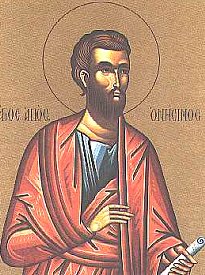|
|||
|---|---|---|---|
| This weekly bulletin insert complements the curriculum published by the Department of Christian Education of the Orthodox Church in America. This and many other Christian Education resources are available at http://dce.oca.org. | |||

The Apostle Onesimus of the Seventy began life in Phrygia as the slave of a prominent Christian named Philemon. Saint Paul's Letter to Philemon is the source of some of our information about Onesimus, and about the way his life intertwined with Paul's. For one thing, Paul was acquainted with Philemon. But more importantly, Onesimus and Paul were imprisoned together. Onesimus was not a very satisfactory slave. He had probably stolen from his master, as Paul indicates when he makes a generous offer to Philemon: "If he has wronged you at all, or owes you anything, charge that to my account" (v. 18). Paul also writes that he knows Onesimus was "useless" to Philemon. So probably the slave was a runaway, and ended up in a prison where he met Paul. Some scholars believe this was in Rome, but Paul endured imprisonments in other places, such as Ephesus. This would have been a more likely place for the fleeing Onesimus to reach than distant Rome. But wherever it was that they were confined, the two men had plenty of time to talk with each other. Paul took a fatherly interest in Onesimus, who must have been fearful and wary, and shared the good news of the Gospel with him. Paul's teaching and his loving care had such a profound effect on Onesimus that finally he was baptized. Many people believe that the main purpose of Paul's letter to Philemon was to encourage him to receive Onesimus back with compassion rather than anger. It's true that Paul urged Philemon to go far beyond the usual master-and-slave relationship, asking him to receive the runaway "no longer as a slave but more than a slave, as a beloved brother" (v. 16). Paul even says, "Receive him as you would receive me." He was asking Philemon to remember that all people have God as their common Master, and are equal in His sight. But there was more to the letter. Paul was actually asking to have Onesimus back with him. While not directly requesting Philemon to send him, Paul writes, "I am sending him back to you, sending my very heart. I would have been glad to keep him with me..." (v. 12).
Onesimus was eventually reunited with Paul, continuing to work with him and learn from him. Later he became a bishop, and traveled to far countries to spread the Gospel, carrying on the work of the original apostles after they died. The early Christians insisted that every person, no matter of what class or rank, was welcome to join the family of believers. Onesimus is proof of that, rising as he did from powerless bondage to the rank of bishop. Even when condemned to death as a Christian he was grateful to Saint Paul, another prisoner in miserable conditions who still could convey the joy of Jesus Christ. |
|||
